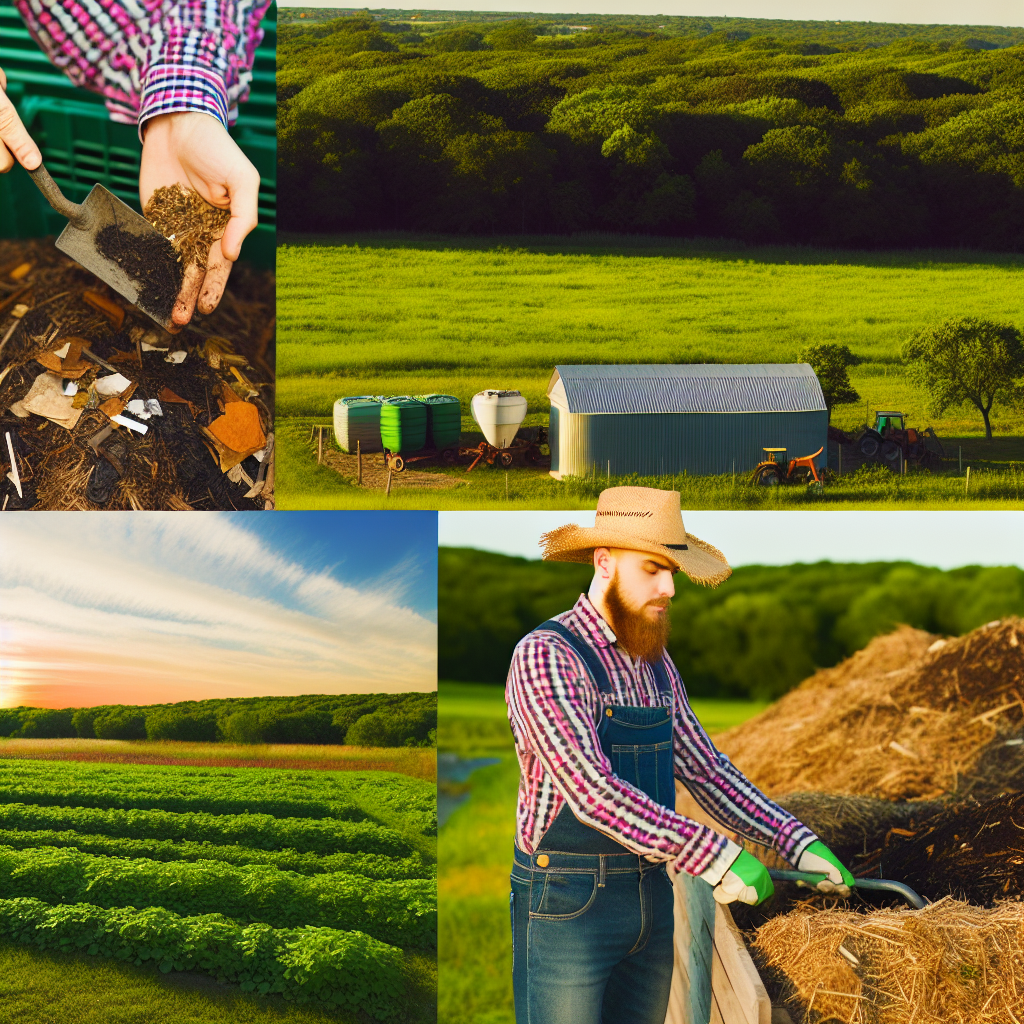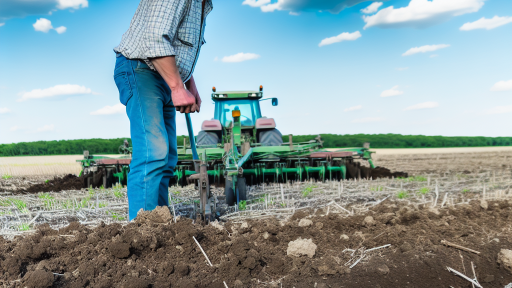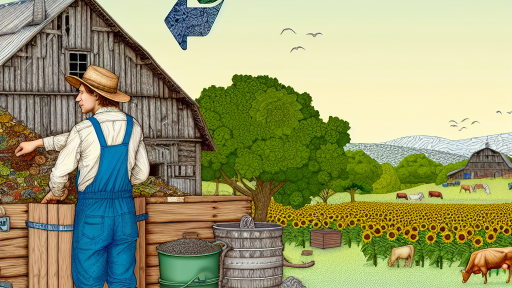Understanding the Importance of Recycling in Agriculture
Economic Benefits
Recycling reduces waste disposal costs for farmers.
It also lowers the need for purchasing raw materials.
Moreover, it can create economic opportunities in local communities.
Environmental Impact
Recycling minimizes environmental pollution and landfill use.
It conserves natural resources, promoting sustainability.
Additionally, recycling supports biodiversity by maintaining habitats.
Fostering Community Engagement
Recycling initiatives can engage local communities in agricultural practices.
They raise awareness about sustainable methods and environmental stewardship.
Furthermore, community programs can lead to collaborative efforts in recycling.
Enhancing Soil Health
Using recycled organic materials improves soil fertility.
This practice reduces the reliance on chemical fertilizers.
In turn, it promotes healthier crops and higher yields.
Implementing Recycling Practices
Farmers can adopt various recycling practices.
These include composting organic waste and reusing materials.
Furthermore, utilizing by-products from agriculture can enhance sustainability.
Transform Your Agribusiness
Unlock your farm's potential with expert advice tailored to your needs. Get actionable steps that drive real results.
Get StartedTypes of Waste in Agricultural Practices
Introduction to Agricultural Waste
Agriculture generates various types of waste that impact sustainability.
Understanding these waste types is crucial for implementing recycling practices.
Several categories include organic, plastic, and chemical waste.
Organic Waste
Organic waste comes from crop residues, animal manure, and food waste.
This type of waste can be composted to enrich soil health.
Effective composting reduces landfill dependency and greenhouse gas emissions.
Plastic Waste
Plastic waste mainly originates from packaging, containers, and tools.
Many farmers use single-use plastics, contributing to pollution.
Recycling programs can help manage plastic waste in agriculture.
Farmers should consider alternatives like biodegradable materials.
Chemical Waste
Chemical waste arises from pesticides, herbicides, and fertilizers.
Improper disposal can lead to soil and water contamination.
It’s vital to follow regulations for handling and disposing of these substances.
Other Types of Waste
Other wastes include obsolete equipment and unused seeds.
Regular inventory checks help manage these waste types effectively.
Farmers should prioritize donations or recycling over disposal.
Importance of Waste Management
Efficient waste management promotes sustainability in agriculture.
It conserves resources and reduces environmental pollution.
Furthermore, proper practices can lead to cost savings for farmers.
- Enhancing soil health through organic recycling.
- Reducing operational costs by minimizing waste.
- Fostering community engagement through waste reduction efforts.
Innovative Recycling Techniques for Organic Waste Management
Utilizing Composting
Composting transforms organic waste into nutrient-rich soil amendments.
This process involves collecting food scraps and yard debris.
Farmers can enhance soil health through compost application.
In addition, composting reduces landfill waste significantly.
Regular monitoring ensures optimal decomposition rates.
Showcase Your Farming Business
Publish your professional farming services profile on our blog for a one-time fee of $200 and reach a dedicated audience of farmers and agribusiness owners.
Publish Your ProfileImplementing Anaerobic Digestion
Anaerobic digestion converts organic material into biogas.
This technique captures methane for energy use.
Farmers can power operations with this renewable energy source.
Moreover, the remaining digestate serves as a fertilizer.
It enriches the soil while minimizing waste output.
Practicing Crop Residue Recycling
Crop residue recycling enhances soil structure and fertility.
Farmers should leave crop remnants in the field after harvest.
This practice protects against erosion and aids moisture retention.
Furthermore, residues decompose, adding organic matter to the soil.
Over time, this promotes healthier crop yields.
Exploring Biochar Production
Biochar is produced from heated organic materials.
This process captures carbon and enhances soil quality.
Farmers can increase soil pH and improve nutrient absorption.
Additionally, biochar retains water, reducing irrigation needs.
Its application results in sustainable farming practices.
Engaging in Community Recycling Programs
Participating in local recycling initiatives fosters sustainability.
Farmers can share resources and knowledge with the community.
Additionally, these programs help collect organic waste efficiently.
Working together improves overall environmental health.
Community partnerships strengthen local food systems.
Discover More: Sustainable Greenhouse Designs For Year-Round Farming
The Role of Composting in Sustainable Farming Operations
Benefits of Composting
Composting enriches soil and supports plant health.
It reduces the need for chemical fertilizers.
Moreover, composting enhances soil structure and moisture retention.
This practice helps mitigate erosion and water runoff.
Composting Materials
Farmers can compost various organic materials.
Common materials include fruit and vegetable scraps.
In addition, yard waste like leaves and grass clippings are beneficial.
Farmers should avoid using meat or dairy products.
These materials may attract pests and create odors.
Composting Techniques
Active composting involves frequent aeration and turning.
This process accelerates decomposition and reduces odors.
Farmers can also build worm bins for vermicomposting.
Worms break down food scraps into nutrient-rich compost.
Incorporating Compost into Farming Practices
Farmers can use compost to amend fields before planting.
This practice boosts soil nutrients and supports crop growth.
Compost tea can also serve as a natural fertilizer.
Farmers should apply it during early growth stages.
Challenges of Composting
Compost management requires knowledge and effort.
Farmers must monitor moisture levels and temperature.
Showcase Your Farming Business
Publish your professional farming services profile on our blog for a one-time fee of $200 and reach a dedicated audience of farmers and agribusiness owners.
Publish Your ProfileThis ensures effective decomposition and quality compost.
In addition, space limitations may pose challenges for some.
Community and Commercial Composting
Local cooperatives can help farmers share resources.
This approach promotes community gardening and sustainability.
Commercial composting facilities also provide options.
These facilities can help farmers manage large waste volumes.
Learn More: Enhancing Soil Health Through Sustainable Farm Planning
Utilizing Plastic Waste
Understanding Plastic Waste in Agriculture
Plastic waste poses significant challenges to sustainable agriculture.
Farmers often face difficulties managing excess plastic materials.
However, innovative solutions exist to reduce plastic usage.
Eco-friendly Alternatives for Packaging
Several sustainable alternatives can replace traditional plastic packaging.
Compostable materials, for example, are gaining popularity among farmers.
These materials break down naturally, enriching the soil.
Biodegradable films are also an effective replacement for plastic wraps.
Innovative Practices to Reduce Plastic Usage
Farmers can adopt various strategies to minimize plastic waste.
- Using bulk bins can reduce reliance on plastic containers.
- Employing reusable bags instead of single-use plastic options enhances sustainability.
- Implementing refill stations for agricultural products decreases packaging waste.
Collaboration with Industry Leaders
Partnerships with companies contribute to developing sustainable practices.
For instance, GreenPack solutions offers eco-friendly packaging innovations.
These collaborations can lead to larger systemic changes in the industry.
Community Involvement and Education
Engaging local communities fosters awareness of plastic waste issues.
Workshops can educate farmers on sustainable practices for packaging.
Sharing successful case studies inspires others to take action.
Explore Further: Implementing IPM for Healthier Crop Yields

Water Conservation through Recycling: Techniques and Benefits
Importance of Water Conservation
Water is a critical resource for agriculture.
Conserving water supports crop health and productivity.
Moreover, it reduces costs associated with irrigation.
Implementing recycling practices maximizes water efficiency.
Techniques for Water Recycling
Farmers can adopt various techniques to recycle water.
First, rainwater harvesting is an effective method.
This technique collects and stores rainwater for reuse.
Second, greywater systems utilize water from sinks and baths.
Such systems can irrigate crops without additional treatment.
Third, drip irrigation minimizes evaporation and runoff.
This method delivers water directly to plant roots.
Benefits of Water Recycling in Agriculture
Recycling water leads to numerous agricultural benefits.
It significantly reduces dependency on freshwater sources.
Additionally, it enhances soil moisture levels.
Healthy soil retains nutrients and water more effectively.
Consequently, crops experience better growth and yield.
Furthermore, water recycling promotes sustainable farming practices.
It aligns with environmental conservation goals.
Showcase Your Farming Business
Publish your professional farming services profile on our blog for a one-time fee of $200 and reach a dedicated audience of farmers and agribusiness owners.
Publish Your ProfileCase Studies of Successful Water Recycling
Many farms exemplify successful water recycling practices.
For instance, Green Valley Farms implemented rainwater harvesting.
This initiative increased their water supply by 30%.
Similarly, EcoGrowers utilized greywater systems effectively.
They reported improved crop yields while saving costs.
Challenges and Considerations
Despite benefits, challenges exist in water recycling.
Initial setup costs can be high for some farmers.
Moreover, regulatory restrictions may limit implementation.
Farmers should also consider water quality for irrigation.
Regular maintenance of recycling systems is crucial.
Find Out More: Transforming Farm Waste into Valuable Resources
Integrating Permaculture Principles in Recycling Practices
Understanding Permaculture
Permaculture offers a sustainable approach to agriculture.
It emphasizes working with nature rather than against it.
This method enhances biodiversity and ecosystem health.
Recycling Organic Materials
One of the core practices is recycling organic waste.
Composting transforms kitchen scraps into valuable soil amendments.
Farmers can also use animal waste to enrich their soil.
This process minimizes waste and improves soil fertility.
Utilizing Waste Streams
Identifying waste streams is essential for sustainability.
Farmers should consider reusing materials like cardboard and paper.
These materials can serve as mulch or plant beds.
Additionally, glass and plastic containers may be repurposed.
Implementing Closed-Loop Systems
Closed-loop systems further enhance recycling efforts.
These systems create a zero-waste environment.
For instance, integrating fish farming with crop production is beneficial.
Fish waste can fertilize plants while plants filter water, creating synergy.
Community Engagement and Resource Sharing
Engaging the community promotes recycling practices.
Farmers can share resources and knowledge efficiently.
Community gardens allow for wider use of recycled materials.
Workshops on permaculture can educate and inspire others.
Innovative Reuse Techniques
Farmers should adopt innovative reuse techniques.
Using old tires as plant containers can be effective.
Rainwater harvesting systems utilize recycled materials as well.
These practices reduce costs while increasing sustainability.
Monitoring and Adapting Practices
Continual monitoring of recycling practices is vital.
Farmers should evaluate the effectiveness of their methods.
Adapting these practices ensures ongoing improvement.
This commitment to sustainability fosters resilient agricultural systems.
Case Studies: Successful Implementation of Recycling in Agriculture
Innovative Use of Organic Waste
Green Farms implemented a composting system for organic waste management.
This practice led to reduced waste disposal costs.
Showcase Your Farming Business
Publish your professional farming services profile on our blog for a one-time fee of $200 and reach a dedicated audience of farmers and agribusiness owners.
Publish Your ProfileFurthermore, it enhanced soil fertility and reduced chemical fertilizer use.
As a result, crop yields increased by 25% over two years.
Recycling Plastic for Agricultural Use
FarmTech Solutions developed a program to recycle plastic containers.
They provided collection points for farmers to return used containers.
This initiative not only minimized plastic waste but also supported local recycling industries.
In addition, it increased awareness about plastic recycling in the agricultural community.
Efficient Water Management Practices
EcoGrowers adopted a rainwater harvesting system for irrigation.
This approach effectively reduced water consumption during dry seasons.
Moreover, the practice helped conserve local water resources.
Farmers reported a 15% decrease in water costs since implementing the system.
Case Study: Urban Agriculture
Sky Farms utilized rooftop spaces to grow vegetables in cities.
This practice allowed them to recycle waste materials from restaurants.
They turned food scraps into organic fertilizers for their gardens.
Consequently, they created a closed-loop system that minimized waste.
Collaboration with Local Schools
Green Pastures partnered with local schools to promote recycling education.
This program taught students about composting and its benefits.
Students engaged in hands-on activities, reinforcing their learning.
Moreover, the initiative fostered community involvement in sustainable practices.
Additional Resources
Adaptation of resilient regenerative agricultural practices by small …




